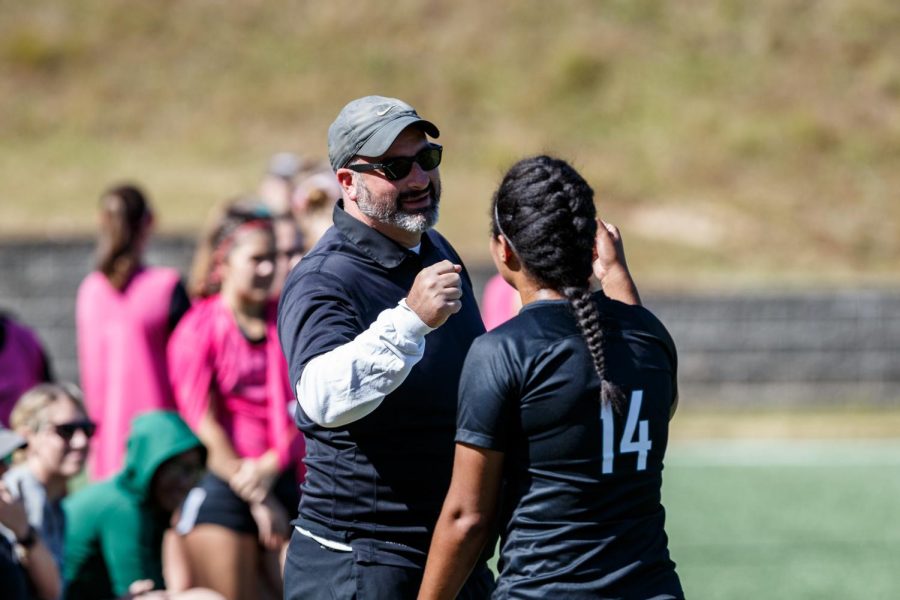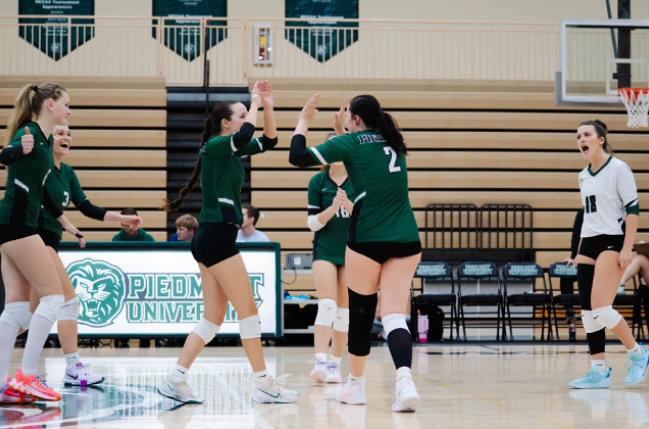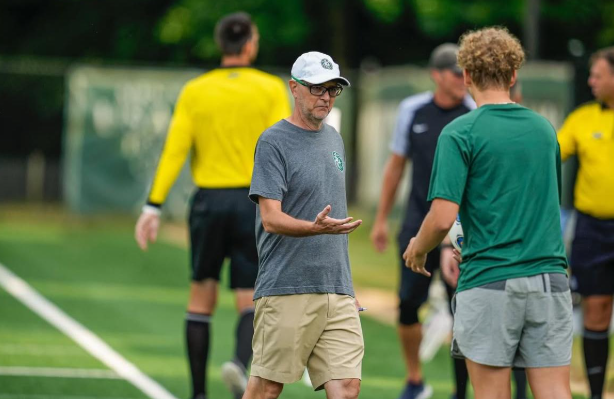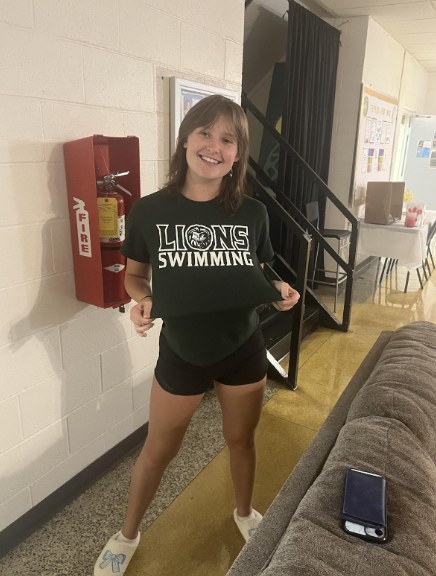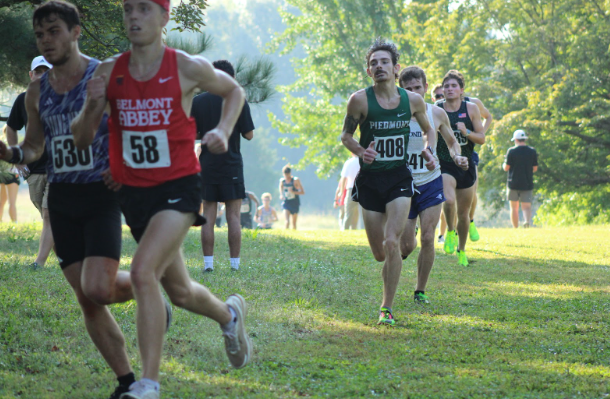“Be Curious Not Judgmental:” A Coach’s Guide to Mental Health
Coach Timmy McCormack teaches the players on Piedmont’s Women’s soccer team about the value of mental health on a weekly basis. PHOTO//KARL L. MOORE
October 27, 2022
Best Sports Feature (3rd place) from the College Media Association.
Something was not quite going right for Gabby Hayes, a junior forward on the women’s soccer team. Although she physically felt fine, she noticed her game was being impacted by the stress in her life.
“I struggled with juggling school, work and soccer last year,” said Hayes. “I talked to (head soccer) Coach Timmy (McCormack) and was just explaining how I felt like I should talk to someone, and he told me to reach out to the counseling services on campus.”
Hayes was able to get in touch with the counselors available to talk about topics such as depression, anxiety, relationships, grief, trauma and much more. The counselors are available for walk-in appointments and one-hour sessions that can be booked online anytime.
“It was nice to just talk to someone with a completely unbiased opinion,” said Hayes. “Sometimes just ranting and getting everything off my chest is very beneficial and helps me refresh.”
Hayes still uses counseling services when she feels overwhelmed and advocates for counseling services for others to help combat their mental health struggles. But it was her coach that instituted the whole process.
“Ensuring the safety of our student-athletes is our number one priority,” said Coach McCormack. “Whether that’s physical, emotional or mental health, we owe it to our athletes to keep them safe.”
McCormack has coached the Lady Lions of Piedmont University for 13 years, five as the head coach. As a 2008 graduate from Huntingdon College in Alabama, McCormack came to Piedmont with experience as a starting defender throughout his college days.
“When I was a player, mental health was not a conversation. It was not normalized,” said McCormack. “I started thinking something was wrong with me when I began struggling with my mental health.”
McCormack recalls his own experience in mental health as a college student and how prevalent it was in his college days.
“I was questioning why I didn’t love the sport as much as I did before,” said McCormack. “It put bad thoughts in my head until I started having those tough conversations with people who have gone through similar situations.”
According to a 2011 NCAA study, “…about 30 percent of 195,000 student-athletes surveyed for the American College Health Association (ACHA) reported feeling depressed in the last 12 months, and 50 percent reported having overwhelming anxiety during the same period.”
McCormack recognizes the mental health struggles that his players encounter daily and strives to create an environment that’s better than the one he was in.
“We’ve normalized the conversation around mental health,” said McCormack. “When you normalize a conversation around any topic, it’s easier for student-athletes to have a dialogue rather than having to explain themself.”
Every week at practice, McCormack discusses mental health with his team and reminds them to prioritize for themselves and others.
“We like to use the Ted Lasso line with our girls, ‘Be curious rather than judgmental’, because at times you may see a player away from a team setting without knowing all the details,” said McCormack. “So reminding my players to be supportive of their teammates and start a conversation rather than being judgmental is important to our program dynamic.”
McCormack uses his stance on mental health in practice and games to show that he supports his players no matter what they are going through. He advocates that players understand that others may need to step away from time to time.
“There is no reason to punish a student-athlete for taking a break,” said McCormack. “If you look at their daily lives, it is no different from those in the workplace. Everyone needs a break, and that is OK.”
Senior nursing major and women’s soccer player Abby Judge recalls her experience of needing a break every once and a while.
“Nursing school gets very overwhelming, and some days I just cannot bring myself to go to practice,” said Judge. “It means a lot to me knowing that if I take a mental health break Coach Timmy will have my back.”
Like many nursing majors, Judge has a tight schedule between tests, classes and clinicals, alongside managing practice and game times.
“I wouldn’t be as fresh on the field if I had just had an 8-hour clinical that emotionally and physically drained me,” said Judge. “Taking time to rest and reset is needed, and Coach Timmy understands that.”
The much-needed breaks that Coach McCormack has encouraged Judge to take have helped lead her to be named Academic All-Conference player two years in a row and First-Team All-American by the USA South based on her performance as a defender on the field. McCormack believes that having those open-ended conversations with his players helps him gain insight into what they are going through.
“That’s the key— a conversation around mental health has to be a dialogue instead of a player explaining or defending why they feel the way they do,” said McCormack. “Sometimes, this may require a break and a time to step away and recharge the batteries. There is no judgment placed on them for stepping away.”
Freshman Peyton Gates from Brea, California, recalls her recruiting process at Piedmont University and how vital the mental health conversation was to her decision.
“One of the big reasons I decided to come to Piedmont was because of Coach Timmy’s stance on mental health,” said Gates. “I hadn’t been on a recruiting trip where the coach talked openly about the topic, and I felt immediately comfortable.”
McCormack’s recruiting efforts have brought student-athletes from all over the country, including California, Arizona, Idaho, Texas and Ohio. McCormack wants his program to be a melting pot of different personalities, ideas, and demographics.
“Recruiting from around the country creates opportunities for these athletes to learn valuable life lessons,” said McCormack. “When there are so many different personalities, one becomes a lot more empathic to their teammates and situations they had never been exposed to before.”
McCormack wants players with varying backgrounds in his program to create a dynamic of contrasting views, opinions, and upbringings. He can learn from his players’ experiences and help promote mental health awareness by having so many personalities.
“We don’t have to be in their shoes or circumstances to validate their feelings,” said McCormack. “With so many high-profile mental health stories coming to light, we want to do our part to prevent the dangers of mental health.”
Coach McCormack notes the most talked about mental health stories in the last few months. The deaths of players like Katie Meyer and Sarah Shulze. The tragic stories of NCAA athletes like Meyer and Shulze have shuddered the community of elite college sports.
“College is a lot, and I know that. It feels like you’re drinking from a fire hose,” said McCormack. “Although mental health awareness isn’t all about suicide prevention, it is one of the key components when advocating for mental health.”
McCormack has created a safe space for players to talk about their mental health struggles and refer them to the counseling services on campus. Although counseling services are always available and can help, there is no “cure” for mental illnesses. Like all people, student-athletes can still have good and bad mental health days.
“Mental health is not something you solve but something you live with,” said McCormack. “I understand that mental health is an uphill battle that can’t be solved overnight.”
McCormack recognizes that having the tough conversation and making the topic normalized is what makes his players safe and comfortable in his program.
“The mental make-up is what affects student-athletes on the field,” said McCormack. “If we’re going to preach how we’re a family on and off the field, we have to start the conversations.”
Coach McCormack has an open-door policy that he is always available to chat when a player is struggling. He encourages his players to seek support from their roommates, friends and team captains.
Developing a winning team happens when a safe environment is created for players to succeed mentally and physically, McCormack said. His philosophy appears to be paying off on the pitch. Since becoming head coach in 2017, the Lady Lions have amassed a 69-23-11 overall record, won four conference title wins, and he was named 2021 USA South Coach of the Year. And that success stems from truly knowing his players — both on and off the field.
“The best coaches are always able to understand where their players are coming from,” said McCormack. “I want every one of my players to be successful after college and will do everything in my power to start that now.”


